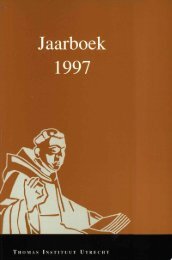Jaarboek Thomas Instituut 1989 - Thomas Instituut te Utrecht
Jaarboek Thomas Instituut 1989 - Thomas Instituut te Utrecht
Jaarboek Thomas Instituut 1989 - Thomas Instituut te Utrecht
You also want an ePaper? Increase the reach of your titles
YUMPU automatically turns print PDFs into web optimized ePapers that Google loves.
118 P. Bakker, M. Brinkhuis, A. Kamp, H. Rikhof<br />
SUMMARY<br />
Testing a Hypothesis<br />
On the basis of the quaestiones that form the start of the Summa<br />
(especially qq. 3-13), the hypothesis is formula<strong>te</strong>d that Aquinas in<br />
those quaestiones does not present an informative, descriptive<br />
doctrine of God, but a set of linguistic rules that enable us to speak<br />
correctly about God. In this article this hypothesis is <strong>te</strong>s<strong>te</strong>d<br />
in<strong>te</strong>rnally via analyses of ST I, q. 21 (de iustitia et misericordia Dei),<br />
ST I, q. 34 (de Verbo), ST III, q. 1 (de convenientia incarnationis) and<br />
ST III, q. 24 (de praedestinatione Christi). Each time it is asked<br />
whether <strong>Thomas</strong> uses the linguistic rules on crucial moments of his<br />
argumentation. In all four quaestiones this appears to be the case.<br />
Moreover, the analysis of ST I, q. 21 shows that here no argument<br />
can be found for a caesura af<strong>te</strong>r q. 13, but on the contrary an<br />
argument for a continuation; the analysis of ST I, q. 34 shows that<br />
the distinction between de Deo Uno - de Deo Trino as traditionally<br />
made in <strong>te</strong>rms of natural reason - revelation (and for that reason<br />
critiàzed) finds no support in this quaestio.








